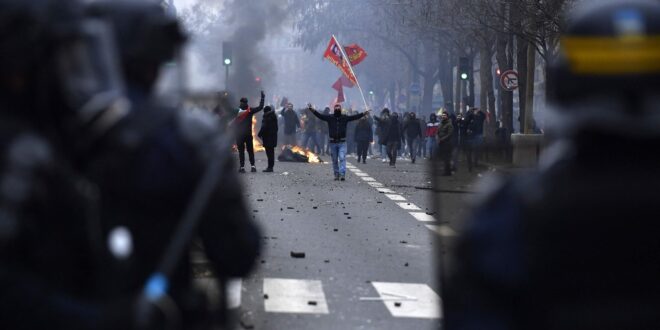A trial of senior figures of the terrorist group PKK accused of extortion, terrorist financing and terror propaganda began in Paris Tuesday. Nine among 11 suspects, who are Turkish citizens, appeared before the criminal court in the French capital.
Investigators believe that France, alongside EU neighbors, offers a staging ground for PKK activities. Organized cells are believed to be active among France’s up to 150,000 Kurdish community and among the 100,000 in the Netherlands and the million-strong community in Germany.
The terrorist group, which emerged about four decades ago as a far-left faction claiming to be fighting for Kurdish rights, exploits the communities in Türkiye and abroad to draw recruits.
The probe in France began in 2020 when two women aged 18 and 19 were reported missing in southeast France. It soon appeared that they had left for PKK training camps elsewhere in Europe.
Tugging on the thread led investigators to a network based around a Kurdish association in Marseille which they say was collecting a form of extortion called a “community tax” and known as “kampanya” that funds the PKK.
Testimony and phone tapping revealed harassment and extortion of diaspora members, they say, as the “tax collectors” set arbitrary contributions for individuals based on their estimated income.
Some people pay the “kampanya” willingly out of “total alignment” with the PKK, investigators say. But many see it as an “obligation” with which they comply for fear of community ostracism or reprisals. One witness said he had been threatened with having his legs broken. Investigators believe around 2 million euros ($2.2 million) are collected in southeast France each year.
They also probed how young men are “recruited” to the PKK in conditions “close to kidnapping and illegal confinement.” Anyone who makes it through “ideological training” in Europe is sent to military-style camps, many in Iraq, and on to fighting forces loyal to the PKK.
France was accused of allowing the terrorist group to carry its propaganda freely. Last year, PKK supporters staged violent riots ostensibly to protest the killing of three people from the Kurdish community.
For a week, PKK terrorist sympathizers rallied across Europe in protest of the racist attack, looting public property, throwing stones at shops and houses, clashing with the police and chanting anti-Türkiye slogans in front of Turkish Embassies.
Protests in Paris saw 31 French police officers injured and 11 detained. Türkiye has been alarmed about the recent insurgence and warned Western countries about curbing public support for the PKK, which feeds itself through human trafficking, drugs and organized crime across the bloc.
In its lengthy terror campaign against Türkiye, the PKK – listed as a terrorist organization by Türkiye, the United States and the European Union – has been responsible for the deaths of over 40,000 people, including women, children and infants.
The terrorist group already faces protests in Türkiye for forcible recruitment of children and brainwashing of the youth to join its ranks.
The families of children abducted by the terrorist group launched a sit-in protest outside the offices of the local branch of the People’s Democratic Party (HDP) in southeastern Diyarbakır province. The HDP is accused of serving as a “recruitment office” for the PKK by Turkish officials.
 Eurasia Press & News
Eurasia Press & News




